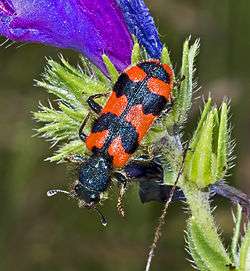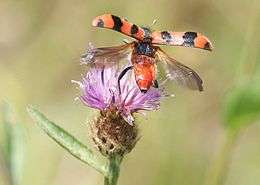Trichodes alvearius
| Trichodes alvearius | |
|---|---|
 | |
| Trichodes alvearius | |
| Scientific classification | |
| Kingdom: | Animalia |
| Phylum: | Arthropoda |
| Class: | Insecta |
| Order: | Coleoptera |
| Family: | Cleridae |
| Genus: | Trichodes |
| Species: | T. alvearius |
| Binomial name | |
| Trichodes alvearius (Fabricius, 1792) | |
| Synonyms | |
| |
Trichodes alvearius is a species of Soldier or Checkered beetle belonging to the family Cleridae, subfamily Clerinae.

Description
Trichodes alvearius is a very hairy beetle with black head and scutellum. The elongated elytra show a bright red colour with black bands. This species can easily be distinguished from Trichodes apiarius by the black stripe down the middle of the back (along the inner edge of the elytra) and the red apex, not reached by the black terminal stain. It does not fly readily, relying instead on its warning coloration to protect itself from predators.
Distribution
These beetles are widely distributed across southern Europe in Albania, Czech Republic, Italy, Greece, France, Germany,[1] Hungary, Poland, Spain, Switzerland, the western half of the Balkans, and in North Africa. The species became extinct in England in the nineteenth century.[2]
Life Cycle
At the larval stage they are parasites of several species of bees and wasps, as the adults lay the eggs close hymenopteran nests or hives (hence the name “alvearius”, the Bee-Hive Beetle), eating various stages of their victims.
The adults can be encountered from May through August on the flowers, mainly Apiaceae, Asteraceae and Crataegus species, feeding on pollen. However, they integrate their diet with small insects that they actively hunt, especially Oedemera, Psilothrix, Stenopterus and Clytus species.
Notes
- ↑ Known in German as Zottiger Bienenkäfer, and in Dutch as Behaarde Bijenwolf
- ↑ "Lost Life". Species Recovery Trust. Retrieved 6 January 2015.